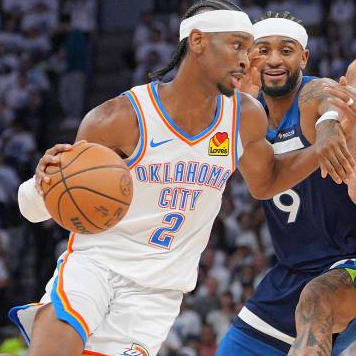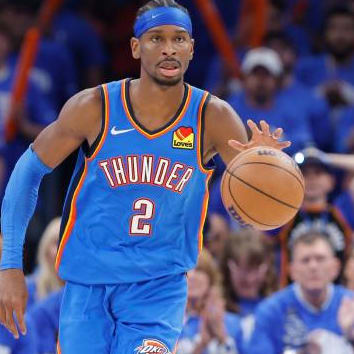This article is part of our The Give and Go series.
The Give and Go
By Charlie Zegers and Carson Cistulli
RotoWire Staff Writers
Rondo is known as an excellent defender. The rest of them? Not a Bruce Bowen in the bunch. (Kidd used to be a pretty fair defender, but these days he regularly gets torched by quick guards.) You could make the case that steals are more about position - the leaderboard is dominated by guys who spend most of their time checking the opposition's primary ball-handler. The real outliers are guys like Josh Smith, Nene, Marcus Camby - guys who play off the ball and still manage to rack up significant steal numbers. As long as we're talking strategery, Zegers, I thought it might make sense to invoke a piece written by Mr. Matt Klaassen recently over at FanGraphs. Yes, it's about fantasy baseball, as opposed to basketball, but the particular sport isn't so important here. Rather, the point is that, for those of us giant nerdbones who take every opportunity to seek out advanced stats (so, in basketball, your PERs or your True Shooting Percentages), "fantasy categories," as Klaassen writes, "aren't as retrograde as one might think, and in fact, may be in one sense more 'realistic' than more recent fantasy scoring methods."
From: Carson Cistulli
Sent: Wednesday, March 31, 2010 3:38 AM
To: Charlie Zegers
Subject: Give and Go: Hidden Skills
So I'm pretty excited right now, Zegers, on account of I've made a pretty substantial leap recently in a league where I'd been sorta hovering near, but not quite usurping, first place spot. The leap is such that I now find myself atop the leaderboard of said league with just about two weeks to go. And while I would never, ever, never, ever endorse -- let alone actively participate -- in the scourge that is gambling, allow me to say that there are several hundred "incentives" for me to pay attention.
In short, I wanna win real hard.
So how've I done it? What precipitated this breakthrough? Probably "luck" is a fair guess. "Tenacity" is another, mostly accurate one. But to whatever degree we might say that "skill" was involved, it was probably my ability to target and roster players who possess "hidden skills."
Let me explain briefly what I mean by that.
It's my contention that most fantasy owners -- even veteran ones, I think -- are sometimes just plain unable to see past the big three categories: points, rebounds, and assists. It's no coincidence, for example, that the NBA bases an entire fantasy game -- the Pick One Challenge -- around those same three cats: they're familiar to people, and knowing how Player X produces in each ought to suggest, roughly, what sort of player he is.
But they don't tell anything like the whole story. I mean, if we're talking 8-cat here, that means we have five whole categories left over. Five categories, that is, to which people are generally paying less attention. And there are more than a few players who actually pick up the bulk of their value in these "hidden skill" categories.
Want some examples? Consider, how about, the case of Stephen Curry. Curry is ranked 13th per Basketball Monster if we assume a typical 12x13, 8-cat league. He's a pretty good player: I think we can all agree on that. That said, if we were merely to assess Curry based on his point, rebound, and assist (PRA) numbers, he'd slip all the way 46th. That's because lot of Curry's value is tied to his sweet steal average of 1.8 per game. That may not seem like a ton, but it's roughly two standard deviations above the mean. That tells us that Curry is basically in the top five percent of all NBA-ers in steals per game.
Denver point guard Chauncey Billups is another example: he's 16th best overall, but only 40th in scoring. The difference? A decent amount of three-pointers and a free throw value that sits at three standard deviations from the mean, or roughly the top 1%.
Finally, consider Danny Granger. On a per-game level, he's ranked fifth out of all players, but only 29th in PRA. His excellent steal and free throw values, though -- those, plus a stunning 2.6 threes per game -- are what make him a truly elite fantasy player.
So whaddaya think, Zegers: Am I misreading the situation? Do you think most fantasy owners actually do understand the value of those hidden skills? And finally: are there any cats that always seem shockingly easy to capitalize on?
From: Charlie Zegers
Sent: Wednesday, March 31, 2010 7:38 AM
To: Carson Cistulli
Subject: Re: Give and Go: Hidden Skills
I think fantasy NBA players, generally, understand that contributions beyond "PRA" (points/rebounds/assists) matter. But really valuing those contributions can be tough, especially when you're talking about categories like steals and blocks where a few tenths on an average make a significant difference. As you point out, standard deviations are key - but any sentence with the words "standard" and "deviation" in it is likely to make the average reader's eyes glaze over.
And I just used both words in that sentence, twice each. Gimme a sec to wake everyone up, using an old SportsCenter trick.
BRETT FAVRE! LEBRON JAMES! A-ROD!
Ok, where was I?
Right. Steph Curry. I don't necessarily think of his overall value as "hidden" at this point. After all, Yahoo! ranks him as the eleventh-best player in the league on the season, ahead of guys like Steve Nash, Josh Smith, Deron Williams and Granger. But I'd happily call it "surprising." As you point out, one of the reasons Curry ranks so high is his contribution in steals. In theory, steals are a product of good defense. In practice, the best description of Curry's defense might be "inept." The fact that he's racking up so many steals goes against his real-world scouting report.
But that might also be one of many ways in which the core NBA stats we're used to seeing in box scores don't do a great job of capturing actual player value. As of today, the league leaders in steals are:
Rajon Rondo (171)
Monta Ellis (137)
Dwyane Wade (133)
Jason Kidd (132)
Curry (131)
To me, that's where the real hidden values in fantasy basketball emerge - the contributions you get from unexpected sources: centers who get steals, big men who hit free throws, guards who rebound, small forwards who block shots, perimeter players who shoot high percentages from the field.
The other factor that, to me, is hard-ish for the fantasy beginner to deal with is the percentage stat - the fact that Kevin Durant's .892 from the line is more valuable to the bottom line than Dirk Nowitzki's .905 because Durant has over 200 more attempts (733 to 524) or that Josh Smith's .635 from the line hurts a team MUCH less than Dwight Howard's .603 - Howard has a league-leading 754 attempts, Smith just 392.
Players who produce at a high percentage with a higher-than-average number of attempts have extra value - and unlike their contributions in counting stats, that extra value is hard to factor in to general fantasy rankings.
From: Carson Cistulli
Sent: Wednesday, March 31, 2010 7:56 PM
To: Charlie Zegers
Subject: Give and Go: Hidden Skills
The point you're making about, for example, fulfilling certain cats with unexpected sources or understanding how field goal or free throw percentages are weighted -- that's when the fantasy owner becomes most like a real-live NBA GM. Like that real-live NBA GM, the fantasy owner has to identify which players are most likely to provide production in certain categories. He (the fantasy owner) has to decide -- during his draft, for example -- how much such a player might be worth. A third-round pick? A twelfth-round pick? These are the equivalent of contracts in fantasy world.
It probably doesn't happen as much in basketball fantasy leagues as in baseball, but it's becoming popular, in the latter, to use more advanced metrics as categories. So, instead of using batting average or RBIs, fantasy leagues might use something like on-base percentage or runs created. The basketball equivalent would be to use, for example, PER or True Shooting Percentage or Win Shares.
The thing is, those advanced metrics are pretty stable year to year. Because the point of them (i.e. the advanced stats) is often to remove context, they tend to demonstrate less variance. That might be good for adjudging a player's actual value, but how interesting is it from a fantasy perspective? Isn't it actually more interesting to have to understand the context in which a player finds himself? Isn't actually more challenging? How much playing time will Player X be getting? Does his team play at a faster or slower pace? Those are the sorts of questions that a fantasy owner needs to ask in an eight- or nine-cat league.
I'm a big fan of that Klaassen article, but I recognize that not everyone is. How do you feel about it, Zegers? About the idea, in general? Have you ever played in a league that uses non-traditional cats? Do you see the virtues in traditional cats?
From: Charlie Zegers
Sent: Wednesday, March 31, 2010 9:14 PM
To: Carson Cistulli
Subject: Give and Go: Hidden Skills
I won't pretend to be an advanced-stat savant. I treat the advanced stats in basketball the same way I treat the numbers in the Daily Racing Form when I go up to Saratoga… they might tell me something I didn't already know… or they might reinforce what I was thinking anyway… but at this point, I'm not comfortable using them alone to guide my decision.
As you say, the goal of using advanced stats and analytics is to put numbers to a given player's value - his skill level. I suppose you could even convert those analytics to ratings for specific attributes… maybe David Lee gets a 74 in offensive rebounding, while Shaquille O'Neal gets an 18 in charisma and Don Nelson's rotation is "chaotic neutral."
(Sorry. Was trying to out-nerd you. Not sure that I succeeded.)
Even if the advanced stats were perfect - and I'm not at all sure they are at this stage - they're still just a tool that we use to predict future performance. And predicting the future is always a dicey business. I don't think using advanced stats will ever remove the element of chance from the game.
Personally, I don't love the idea of playing a league with advanced stats - because I don't think they're accessible enough right now. Points and rebounds and steals and blocks I can still get from the SportsCenter crawl - once you start talking about True Shooting Percentage and PER and whatnot, it becomes a lot more like work.
From: Carson Cistulli
Sent: Thursday, April 1, 2010 12:35 AM
To: Charlie Zegers
Subject: Re: Give and Go: Hidden Skills
Yeah, so far as I know, the advanced basketball stats aren't perfect right now. Not at all. Because the game is so fluid and so reliant on the the interaction of teammates, it's difficult to say who ought to get credit for a field goal, for example.
Because baseball is turn-based, it's pretty easy to say who should get credit for a single or whatever. But what about, in basketball, when a team scores two points: who ought to get credit? Is it the guy who scored the basket? who made the last pass? And what about the talented three-point shooter who pulled hid defender way out to the wing? What credit does that guy get? Those are tough questions.
And as for defense -- defense is a whole nother story. As you suggest, steal totals certainly aren't the best way to evaluate defensive play. But here's the thing: when we make steals a category in fantasy basketball, are we really even saying that we want the best defenders? Or are we just saying we want the guys with the most steals? I think the latter is perfectly acceptable.
Article first appeared on 4/2/10











